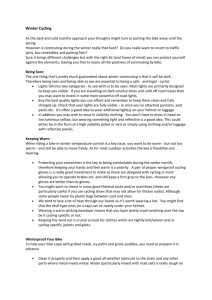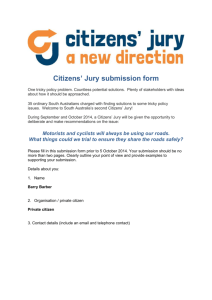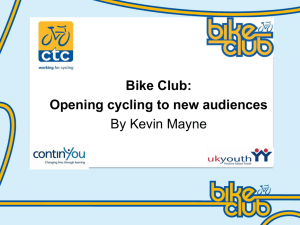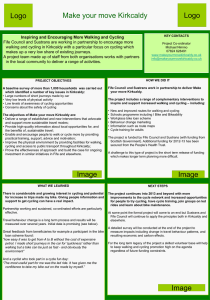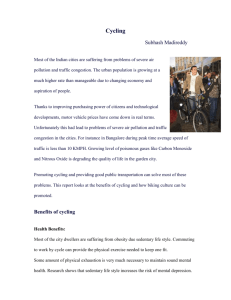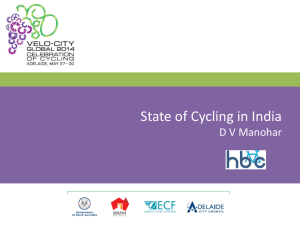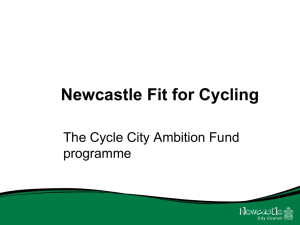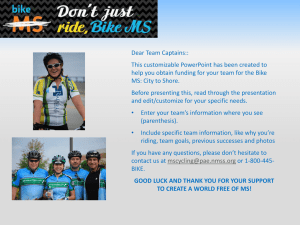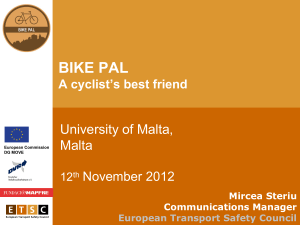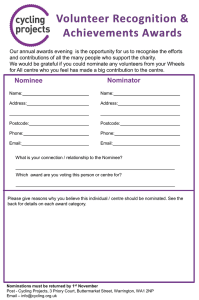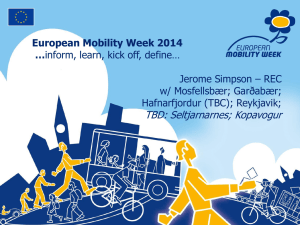Talking Points for Advocates
advertisement
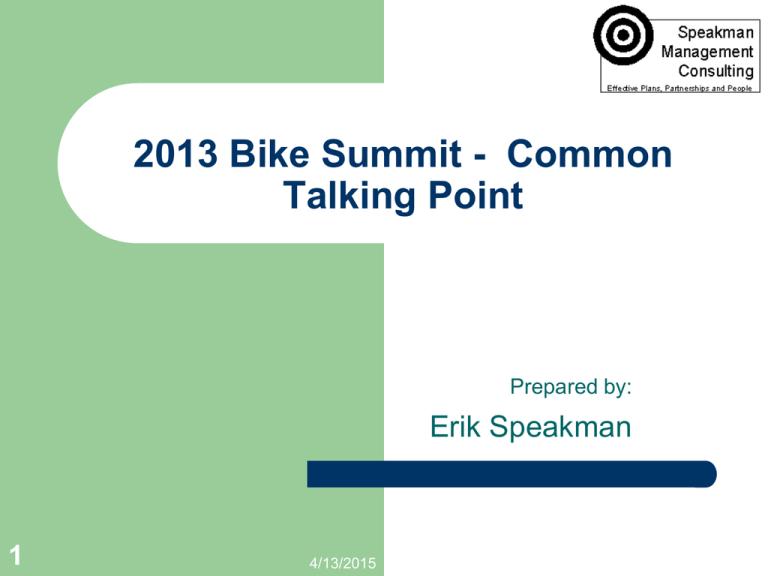
2013 Bike Summit - Common Talking Point Prepared by: Erik Speakman 1 4/13/2015 Agenda 2 Opening/Introduction Cycling Current Situation Current Research Explore Common Talking Points Next Steps 4/13/2015 About Speakman Management Consulting Facilitate the development of effective plans, partnerships and people for small-to-mid sized organizations. Our organization services will include: – – – – 3 Non-profit merger and strategic restructuring Strategic planning and implementation Facilitation of retreats and other working sessions Personal Development, Training and Coaching 4/13/2015 About Erik Speakman Erik Speakman has over fifteen years experience facilitating strategic planning, implementation and change initiatives. A certified mediator with an MBA in Finance and Strategic Planning from Georgia State University, Erik blends expertise in business basics with an ability to identify and troubleshoot potential conflicts and challenges to implementation. Erik has broad experience in designing and facilitating management training and organizational development programs. He has conducted leadership development, planning and partnership workshops at a number of conferences, including the Georgia Center for Non-Profits Summit and the Georgia State University. 4 4/13/2015 Selected Client Experience 5 ACTION Ministries Atlanta Bicycle Coalition Atlanta Regional Commission CDC Community Foundation for Greater Atlanta East Lake Foundation Foundation Center Georgia Bikes Georgia Conservancy Georgia Division of Public Health Habitat for Humanity PEDS Trees Atlanta United Way 4/13/2015 Cycling – Situation Analysis 6 Cycling is on an upswing and more mainstream Increases in cycling infrastructure Stronger interest by politicians and government employees More riders create more ‘challenges’ with cars Opportunity to make a big impact - strike while 15 minutes of fame are hot - expand the 15 minutes 4/13/2015 Recent Research for League of American Bycyclists Perceptions and Possibilities! Stakeholder opinion on the status of bicycling in the national policy arena" By Douglas Meyer of Bernuth & Williamson ! Objectives – – – 7 – Obtain through a series of in-depth interviews the opinions of the national policy community, with a focus on bicycling as transportation Obtain through a survey the opinions of leading advocates, specifically those at the Bike Summit Analyze, compare and contrast Provide recommendations 4/13/2015 Methodology Interviews (January-February) 30 in-depth conversations with policy leaders identified by the League – – – 8 9 House staff & 11 Senate staff – 10 Republican and 10 Democrat 10DOT/Other identified by the League on a scale from “strong opponent” to “strong supporter.” A sample of 281 registered for the National Bike Summit the Summit 4/13/2015 Findings 9 Cycling accepted by policy leaders Disagreement is less about the ends and more about the means. Do take lack of any funding as dislike by policy leaders - “Fair Share” argument does not work Part of big picture and comprehensive solution – multi-modal transportation 4/13/2015 Research Recommendations 10 Think national, talk local (support and decisions) Tell success stories, emphasizing benefits to others - public health, economic & reduce traffic Be inwardly bike-centric, but outwardly multimodal and mainstream Note budget constraints, explore existing options Thank old allies, and cultivate new ones - local leaders and current non cyclists Know your specific audience’s interests and perspective (e.g. “Keeping cars safe from bikes”) 4/13/2015 Common Talking Points General Public in GA 11 Cycling is a key aspect of a thriving livable city – a part of the solution Bike riding has a triple bottom line - it is good for the individual's health, fiscal health/economic development and for the planet Cycling is family-friendly, safe and ‘attractive/cool’ We were bike riders before we became automobile drivers Properly share all roads for all - drivers, bike riders and peds Never ending education on safety for bike riders, the public, civic leaders and, especially, youth about the rules of the road Cyclists can maim, injure & kill themselves and others with a bike We may be hard headed on certain issues but there is no excuse to not wear a helmet when cycling! NEED TO INCLUDE DATA AND PERSONAL STORIES 4/13/2015 Common Talking Points – From the Workshop 12 Pledge for cyclists sharing the road properly and obeying rules is our priority Cycling is key to economic development, including tourism Improved quality of life, especially health Cycling is a safe and fun transportation ‘choice’ “FACES of Cyclists”: everyone/anyone does & can ride Truth about roads - mostly paid with property and sales; and cyclists pay fair share of taxes Cycling is cool – cycling is a choice of innovative and creative entrepreneurs and workers 4/13/2015 Process to Keep in Mind 13 Listen first - listen to your audience before promoting messages Target populations - cyclists to obey rules (work with ride leaders), and then youth Document the diversity of ‘FACES of Cyclists’ Continue to reference the 3 feet rule Key vehicle to deliver the message - Bike Shops, Bike Clubs and Ride Leaders 4/13/2015 Common Talking Points Legislative Policy in GA 14 Should it be different then Talking Points for general public? If needs to be different, what are these unique messages? 4/13/2015 Next Steps Process to finalize and communicate to rest of GA cycling community – an organization to own Priorities for communicating these common talking points- cyclists and youth via bike shops and clubs How do we communicate these messages? – – – – 15 Be an advocate/ambassador Use technology more Walk the Talk – obey the rules Meet with your representatives 4/13/2015
